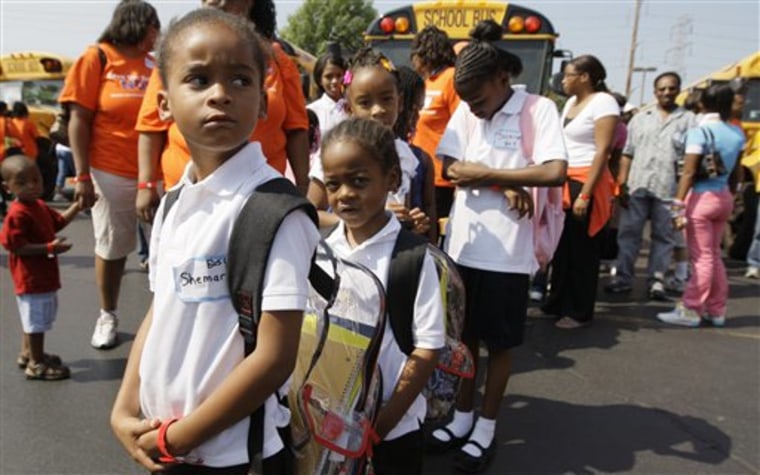More than 1,000 Chicago public school students boycotted the first day of classes Tuesday in a protest over school funding and instead rode buses more than 30 miles north to try to enroll in a wealthy suburban district.
About 1,100 elementary students and 150 high school students from Chicago filled out enrollment applications Tuesday in the New Trier district in Northfield, New Trier Superintendent Linda Yonke said.
Boycott organizers acknowledged the move was largely symbolic: Students would have to pay tuition to attend a school outside their home district. But the boycott of the nation's third-largest school district was to continue, with organizers planning to set up impromptu classrooms led by retired teachers in the lobbies of businesses.
State Sen. James Meeks is leading the boycott of the district, which has more than 400,000 students, and said he hopes the protest forces state officials to act.
"I do not believe that a child's education should be based on where they live," Meeks said. He compared the issue to apartheid in South Africa and said the situation makes it difficult for children to rise from poverty.
"We undereducated these kids' parents, we undereducated their grandparents and now we're in the process of undereducating them," Meeks said.
Similar to the bus boycott
On the bus ride, volunteers told the children they were taking part in a historic event similar to the bus boycott in Alabama in the 1950s.
Fourteen-year-old Tracey Stansberry, a student at Corliss High School, said he was glad to take part.
"It's on us kids," he said. "If we don't, we'll be on the bottom."
In Illinois, property taxes account for about 70 percent of school funding, meaning rural and inner-city schools generally end up with less to spend per student than suburban schools in areas with higher property values.
Chicago Public Schools spent $11,300 per student last year. New Trier High School spent $17,500 a student, near the top in the state.
Peggy Richmond, who accompanied her 12-year-old granddaughter Skyler Williams on the boycott, said she was forced to enroll Skyler in a private school because of the poor quality of the public schools in her Chicago neighborhood.
"I'm still angry," she said of having to pay $650 a month in tuition to ensure her granddaughter gets a good education.
Protest 'not the way'
Chicago school officials did not immediately return a phone call Tuesday. They have said that they agree their schools are underfunded, but that keeping students out in protest was not the way to resolve the issue.
Meeks said he expects the boycott to run at least until Friday, and some parents and students said they're willing to keep their children out of school for as long as it takes to get state action on the funding issue.
Meeks has asked Gov. Rod Blagojevich and legislative leaders to support a $120 million pilot program. The money would be distributed to four clusters of schools — high schools and their feeder schools — on Chicago's West Side, South Side, south suburbs and downstate.
But the governor and legislative leaders so far have made no promises.
Yonke, of the New Trier district, said many factors affect school performance, including supportive parents and hardworking students. But she acknowledged that money played a role.
"There's also no denying the fact that funding allows us to have smaller classes, a deep and rich curriculum and many extracurricular activities," Yonke said.
